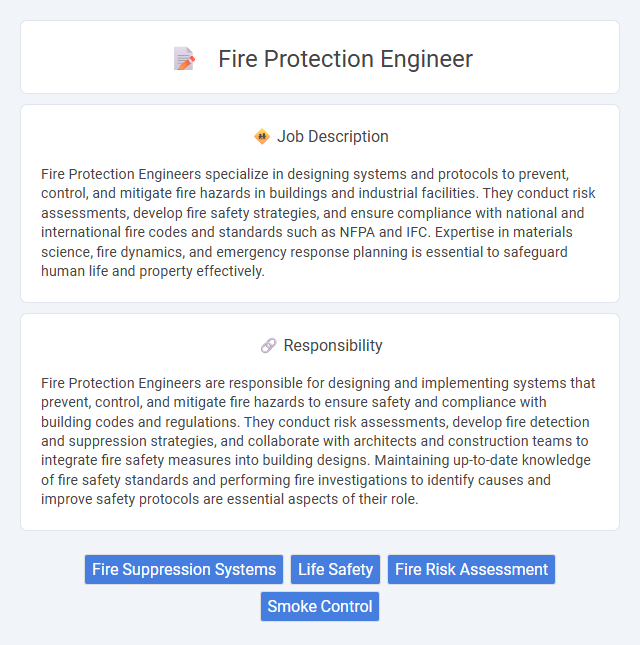
Fire Protection Engineers specialize in designing systems and protocols to prevent, control, and mitigate fire hazards in buildings and industrial facilities. They conduct risk assessments, develop fire safety strategies, and ensure compliance with national and international fire codes and standards such as NFPA and IFC. Expertise in materials science, fire dynamics, and emergency response planning is essential to safeguard human life and property effectively.
Individuals with strong analytical skills, attention to detail, and a passion for safety are likely to be well-suited for a Fire Protection Engineer role. Those who are comfortable working in high-pressure environments and have a keen interest in preventing fire hazards may find this career fulfilling. However, people who prefer minimal responsibility for public safety or lack technical aptitude might struggle to excel in this field.
Qualification
Fire Protection Engineers require a bachelor's degree in fire protection engineering, civil engineering, or a related field, often complemented by professional licensure such as the Professional Engineer (PE) certification. Strong knowledge of fire dynamics, building codes, risk assessment, and safety regulations is essential to design effective fire prevention and suppression systems. Advanced qualifications may include certifications from organizations like the Society of Fire Protection Engineers (SFPE) to enhance expertise and career opportunities.
Responsibility
Fire Protection Engineers are responsible for designing and implementing systems that prevent, control, and mitigate fire hazards to ensure safety and compliance with building codes and regulations. They conduct risk assessments, develop fire detection and suppression strategies, and collaborate with architects and construction teams to integrate fire safety measures into building designs. Maintaining up-to-date knowledge of fire safety standards and performing fire investigations to identify causes and improve safety protocols are essential aspects of their role.
Benefit
Fire protection engineers likely experience significant benefits including enhanced workplace safety and reduced risk of fire-related incidents, which can lead to lower insurance costs for employers. They probably enjoy career growth opportunities due to increasing regulatory demands and advancements in fire safety technology. Their expertise may result in a strong sense of professional fulfillment by protecting lives and property from fire hazards.
Challenge
The role of a Fire Protection Engineer likely involves complex challenges related to designing systems that effectively mitigate fire risks in diverse environments. Navigating building codes, safety regulations, and evolving technologies may present ongoing difficulties that require innovative problem-solving skills. There is also a probability that these engineers must constantly update their knowledge to address emerging hazards and ensure compliance with stringent safety standards.
Career Advancement
Fire Protection Engineers enhance safety by designing systems that prevent and mitigate fires in buildings and industrial facilities. Career advancement often involves progressing from entry-level roles to senior engineering positions, project management, or specializing in areas like smoke control or hazardous materials handling. Obtaining certifications such as Certified Fire Protection Specialist (CFPS) and gaining expertise in codes like NFPA and IFC significantly boost professional growth and leadership opportunities.
Key Terms
Fire Suppression Systems
Fire Protection Engineers specializing in Fire Suppression Systems design, evaluate, and implement automated systems to detect and extinguish fires in commercial, industrial, and residential buildings. They ensure compliance with NFPA standards, optimize water, foam, or gas-based suppression mechanisms, and integrate advanced detection technologies to minimize property damage and enhance occupant safety. Expertise in hydraulic calculations, system layout, and code enforcement is essential to develop efficient, reliable fire suppression solutions.
Life Safety
Fire Protection Engineers specialize in designing systems and protocols that ensure life safety by preventing and mitigating fire hazards in buildings and infrastructure. Their expertise includes analyzing fire risks, developing evacuation plans, and integrating advanced fire detection and suppression technologies to protect occupants. Compliance with NFPA codes and OSHA regulations is critical to their role in safeguarding human life during fire emergencies.
Fire Risk Assessment
Fire Protection Engineers specialize in fire risk assessment by analyzing building designs, materials, and systems to identify potential fire hazards and ensure compliance with safety codes. They use advanced modeling tools and data from past fire incidents to develop prevention strategies and optimize fire suppression systems. Their expertise is crucial for minimizing property damage and enhancing occupant safety in commercial, residential, and industrial structures.
Smoke Control
A Fire Protection Engineer specializing in smoke control designs and implements systems to manage smoke movement in buildings during fire incidents, enhancing occupant safety and aiding emergency response. Expertise in computational fluid dynamics (CFD) modeling, fire dynamics, and regulatory standards such as NFPA 92 is essential for optimizing smoke extraction and containment strategies. Collaboration with architects, HVAC engineers, and fire marshals ensures integrated solutions compliant with building codes and performance objectives.
 kuljobs.com
kuljobs.com